#I wonder if they know anything
Explore tagged Tumblr posts
Note
Honestly the sheer amount of interactions that could come from the triplicate space being discovered is amazing. Either way it’s a huge catalyst for some crazy plot lines
On one hand… if the journalist tells the group then it’s the matter of all of them dealing with this mess. “Congrats, we all have targets on our backs! Let’s hope they don’t learn too much about us while we try to get our lives back together!”
And if they don’t tell everyone/only tell one or two grumps? If it’s a “for your own good” kind of deal? Can you imagine how anybody who wasn’t told would react? I’m going this route myself with my own writings and needless to say the potential is insane.
YEAH
I am gonna talk most in relation to the journalist and Triffany because that’s what’s mainly been on my mind but I’d like to share the booklet description of her

This was written by Clumby and the ending ‘it looks like Triffanys out to make all the same mistakes. Rest in peace Bronica’ makes me explode. Please please let me tell her. The parallels and emotions that can be explored here are too good. The idea of Journalist and Triffany going to all of Bronicas camps to try and figure out what happened and then they get here and listen to all the recordings. Wah
And then even without telling anyone imagine being the journalist. You are already dealing with the stress of keeping a population fed and also dealing with all of their personal issues and then you have to deal with finding out that there is someone monitoring everything. Someone who, from the recordings, seems to not be afraid of ‘dealing with things’ AND YOU CANT TELL ANYONE. I do understand that this is probably more of a gameplay point because of the can of worms that’d open up but still. I don’t think I’d be able to look anyone in the eye after that
#bugsnax#there is a whole lot more you can do with this#but this is what I’m able to put into proper words#asks#ALSO#the entrance is literally where Floofty lives#considering that and that wierd letter where they impersonate Beffica#I wonder if they know anything#I dont think they are directly involved#but it’s just strange
16 notes
·
View notes
Text
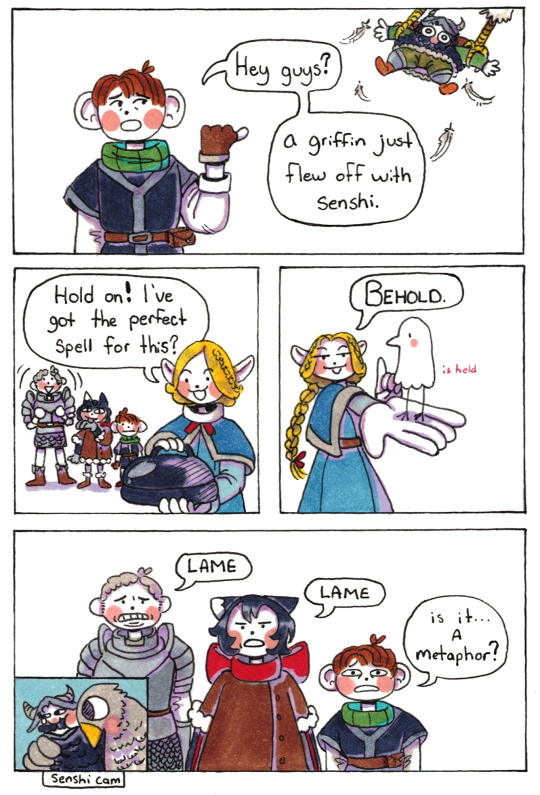
Hey now, Let her cook!
#dungeon meshi#chilchuck tims#senshi#laios touden#marcille donato#izutsumi#oyasumi punpun#<- In case you are wondering what the source for the little bird guy is.#Yeah that's right. I'm back to my extremely obscure crossover BS.#Punpun is one of those series that falls under the category of 'Good! but I cannot responsibly recommend this to anyone."#If Dungeon Meshi is like a friend asking you to go on a quick errand and you accidently go on a life changing roadtrip -#Punpun is your friend asking to go on a quick errand and they pull up to the vet and tell you your dog is being put down.#Then they explode into sludge. Melting your car. You hitchhike back but the person who picked you up is an axe murderer.#I could not finish it. My friends who did say it was good. But agree it was for the best I did not finish it.#Hey speaking of tone twists...We are one episode away from one of my favourite chapters being animated!#WHO'S READY FOR THE SENSHI BACKSTORY! WHO IS READY TO CRY!#ME! I AM! I spooked my flatmate with how energetic I was this morning. I'm vibrating with energy I was not designed to contain.#I should talk about today's episode here: It was very good. I love how they animated the familiars.#And!!! Anime only people now are in the loop on the Chilchuck lore. Part 1 of many. He still contains multitudes.#They all do to be honest! If this episode told us anything it was that we still don't know these characters as well as we think!#See you guys next week. I'll be inconsolable.
15K notes
·
View notes
Text
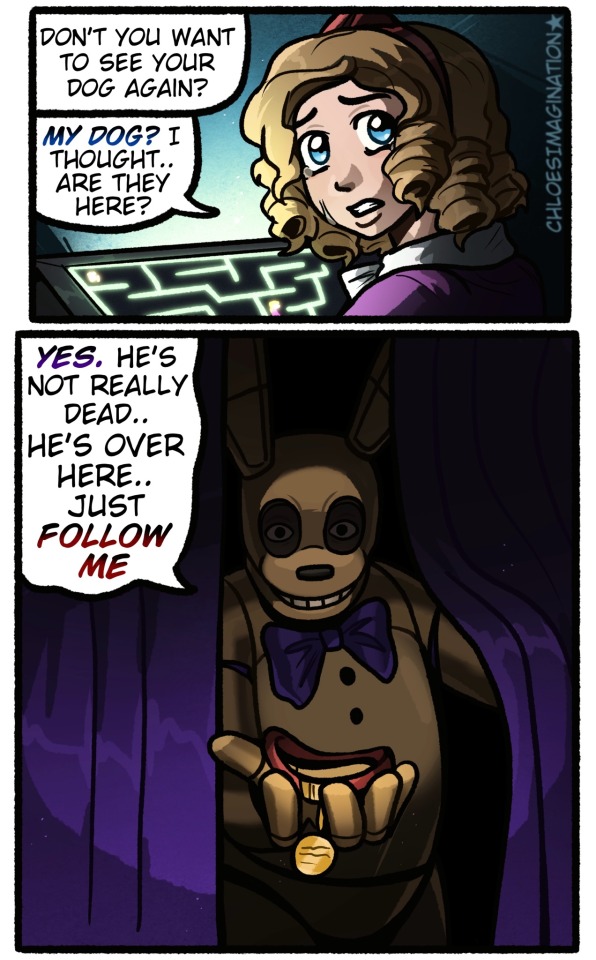
Susie meets the friendly yellow rabbit in FNAF..
#myart#chloesimagination#comic#fnaf#five nights at freddy's#fnaf fanart#william afton#susie fnaf#fnaf pizzeria simulator#spring bonnie#yellow rabbit#‘can you get the dog please? I know how to get there..’#since drawing the Charlie comic I’ve been wondering what I should do in that vibe next#it only felt right to focus on Susie’s story#after Charlie David Cassidy etc I think Susie is the next most important ghost child#we know a lot about her#and her story is horrific it really gets to me#William kills her dog to test remnant#then uses her dogs death to lure her to test a humans remnant#ITS sick and twisted#it’s how William uses anything to his manipulation even grief especially grief#I sniffle and sob over Chica and the cupcake
6K notes
·
View notes
Text
"Do you know the new tiktok trend where--" No.
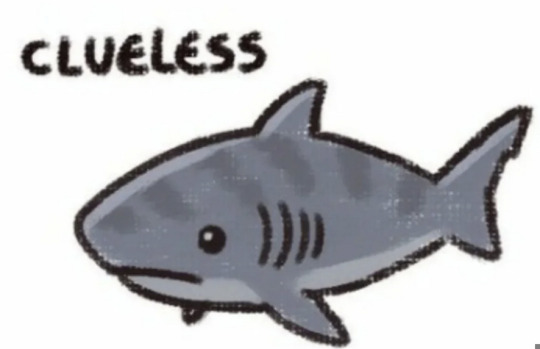
20K notes
·
View notes
Text









Leo learns something about himself 🏳️⚧️
Based roughly on this old post.
Bonus:

[Leo is taking the fact that he was born biologically female simultaneously very well and also not so well but overall he’s mostly coping with the fact that it was Draxum that just essentially gave him the turtle equivalent of ‘The Talk’.]
#rottmnt#rise of the teenage mutant ninja turtles#rottmnt leo#rise leo#trans leonardo#trans leo#rottmnt headcanons#turtle art tag#rise draxum#happy pride everyone~#if you’re wondering why there’s no backgrounds that’s because my files got messed up so just blankness in the bg sorry#but yeah!#this is forever and always my fav headcanon for Leo it makes too much sense to me#I wanted to make sure I got it done in time for pride haha#I don’t know if it’s obvious by the end but Draxum ran off because he was for once doing something nice for Leo#that being leading him somewhere else not in front of everyone so Leo can process the fact that he was born female in peace haha#(but he also just - wanted to avoid the ensuing awkward Talk as long as he could lol)#“how would Leo NOT know’’ he had an inkling but never thought much of it because he’s a teenage turtle mutant with no access to healthcare#also yeah that’s splinter’s hand at the end there I just KNOW he’d want those pics#also also - Leo here can technically be trans or even intersex in some way too#both is good#making this made me remember why I never do color#at least for comics#it just takes sooo long#but it was fun and worth it for my fave hc#this is like the first time I’ve drawn Draxum and man he’s kinda hard to draw#also their sizes are just 1 2 and 3 because Draxum had a simple system in place for sizing his subjects#(aka I was too lazy to think of anything else to put there)#also dunno if anyone noticed but look at Raph’s paper and look at his baby’s self’s photo
6K notes
·
View notes
Text
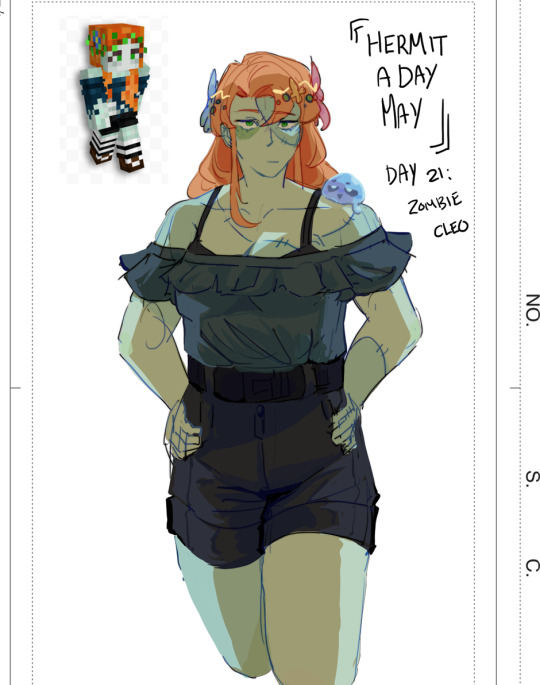
do you guys ever think about that time she said her backstory was that she was only partially zombiefied and was fully conscious mentally while she ate and killed her family. and that she was a princess. i do alot.
#hermitaday#zombiecleo fanart#zombiecleo#hermitcraft fanart#hermitblr#my art#cw cannibalism#cannibalism#no but seriously. i know it was her wow character lore but what a fucked up concept for a sensation that is#being in like. cutscene mode watching yourself murder your family. jesus christ man#no wonder she's so messed up like. wow#please take this as an apology after my unhinged ramble post the other day on my sideblog abt why i wanted to put cleo in a shredder#i still do btw. i don't take back anything i said but like. sorry. you're cool cleo
3K notes
·
View notes
Text





Yes, I'm late.
But I hope you all had a wonderful Christmas/Holiday!🎅
Shin and Minus One were just excited and happy to see Santa. They a little confused but they got the spirit!
And no, Santa is not dead... Just... frightened :)
#godzilla#godzilla x kong: the new empire#godzilla minus one#shin godzilla#godzilla ultima#godzilla earth#christmas#christmas 2024#shin and -1 were staying up all night waiting for santa#they were so excited!#they meant no harm (to santa at least)#yes their way of showing excitement is very questionable...#they a little confused but they got the spirit!#good for them!#also Ultima wearing facial masks is gonna be part of my lore#why not#he's the type that cares about appearances#also Earth just out there being earth#anyway i was busy so I couldn't post or draw anything on Christmas#better late than never ya know?#hope you guys had a wonderful holiday tho :)#do not repost#my art
653 notes
·
View notes
Text
Sixty years ago today, John was accused of having red hair




Sound definitely needed for John's voice and laugh...
The Beatles at San Francisco airport, 18th August 1964 - part 1 (part 2)
#for someone who knows jane asher I can understand his confusion#look at ringo's happy face#I wonder if the shower is anything to do with the privacy he and paul had earlier#it was sixty years ago today#john lennon#ringo starr#the beatles#javelin's gifs#javelin's gifs: 1964#javelin's gifs: john#javelin's gifs: fave
903 notes
·
View notes
Note
Serious question.
Do you think we’ll see the parents/family of each of the guys???
Like, We’ve been TEASED with Ace’s brother, that I’m starting to think it’s just a reference to that Alice in Wonderland park character in Japan and nothing else….
Jack’s family, Ruggie’s grandma, Falena, Maleficia, Ms.Rosehearts, Just now Vil’s dad is in the picture which I am really happy but now I’m wondering about his mom, and so Deuce’s mom.
I mean, some HAVE a silhouette!! It could mean they do have a design in the making/ready to show. They could’ve shown us Falena in the Tamashina (hope I said that correctly) event, but didn’t (prolly to make Leona not so σ(▼□▼メ) and it’s understandable)
Anyhow, any idea/headcannon about this? Who do you want to see first?
I'm wondering if everyone might eventually get a travel event? like they've now introduced with Vil's that it doesn't have to be specifically hometowns, so that opens things up a lot! (especially if they have to figure out how to do three separate Coral Sea visits) (how would that even work otherwise)

but yeah, I hope everyone gets a chance! there's a lot of backstory characters I would LOVE to meet. :D :D :D though I do think some of them don't really suit the more light-hearted tone of the events (pretty sure you're right about that being why Falena wasn't in Tamashina-Mina, that would've just been. too much for Leona.) so like...we're probably not ever going to meet the Rosehearts. or Maleficia (although I maintain that this would be THE funniest possible way to introduce her outside of the main story, and actually I would love this a lot, can we please Twst) (I need to see her to put Malleus in a froofy little outfit and tell him what a handsome boy he is). but they've sprung surprises like Kifaji on us, and honestly anyone who shows up and tells embarrassing stories about characters' childhoods is good in my book!
characters off the top of my head who I most want to meet: literally any of the Zigvolts, Azul's mom, Ace's brother, Che'nya's grandfather (<- I think he would be a good one for Riddle) (please just any non-terrible adult in his life), any member of Rook's family because I need to see how they managed to produce him, and...really just whoever they can come up with for Silver.
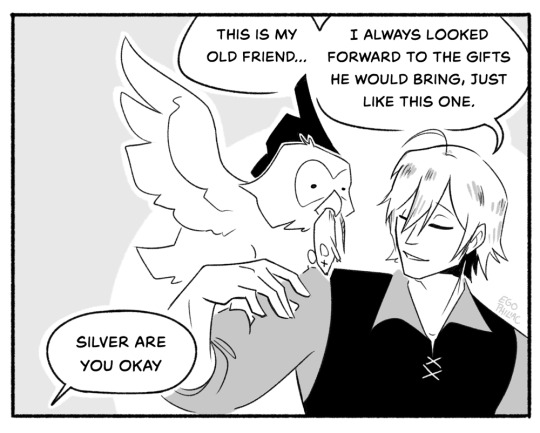
#art#twisted wonderland#twisted wonderland spoilers#tapis rouge#tamashina mina#i think it's just those two#(i am very very sorry about how long it took to reply to this)#but yeah i don't know if everyone is actually doable! i just want to ~believe~#though silver would also have one of the zigvolts honestly#(they are the only reason lilia managed to actually raise him without silver like. falling through a manhole looney tunes style.)#so let's say he gets sebek's mom and sebek gets his dad. just because it would make sebek VERY annoyed.#god i want to meet azul's mom though. everything we know about her makes her sound AMAZING#i want her to feed me lunch and teach me how to take no shit#ANYWAY i do also wonder about vil's mom...#i had been thinking we might learn something about her during tapis rouge. but nope! not a mention.#i guess we did establish that vil either went with eric or was cared for by the house staff when he was traveling#so i dunno! it doesn't necessarily mean anything she might just be a busy lady doing busy things#i just wonder!
2K notes
·
View notes
Text


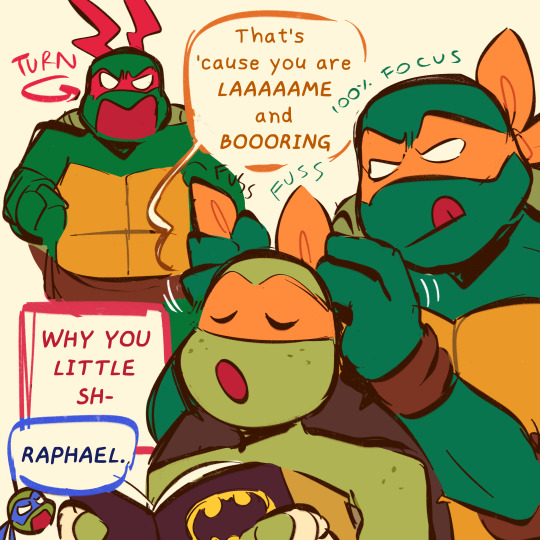
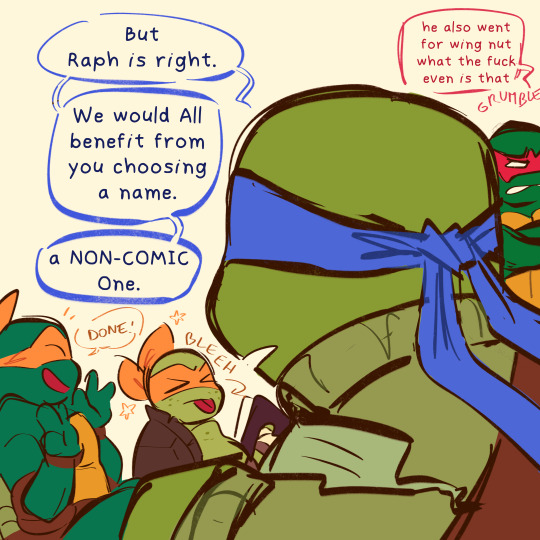
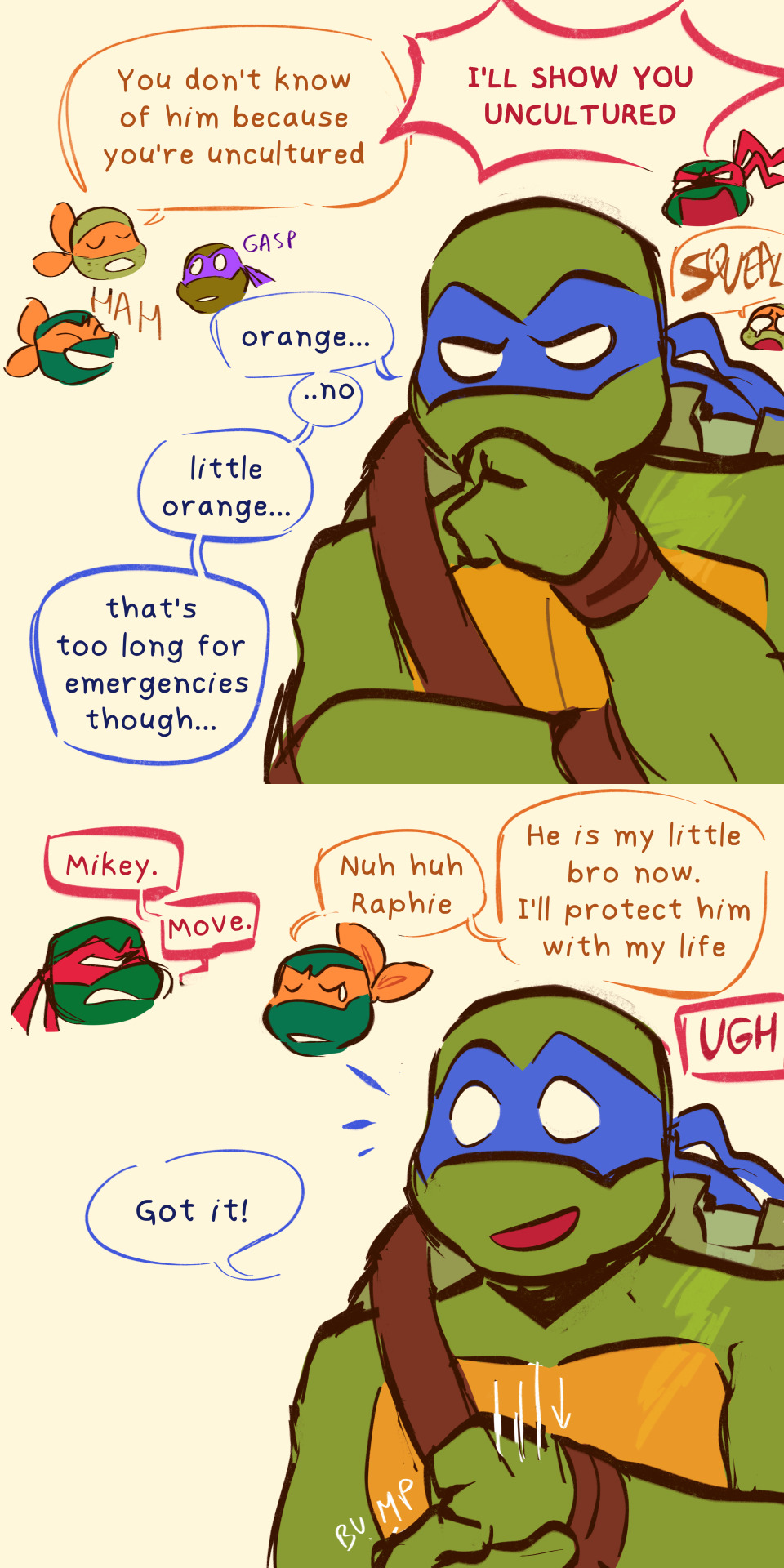

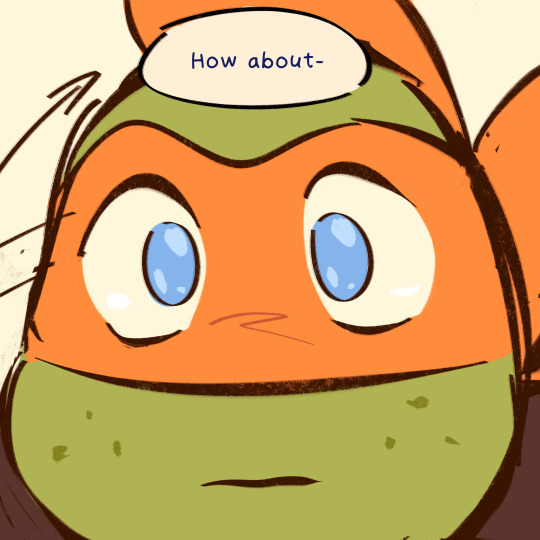


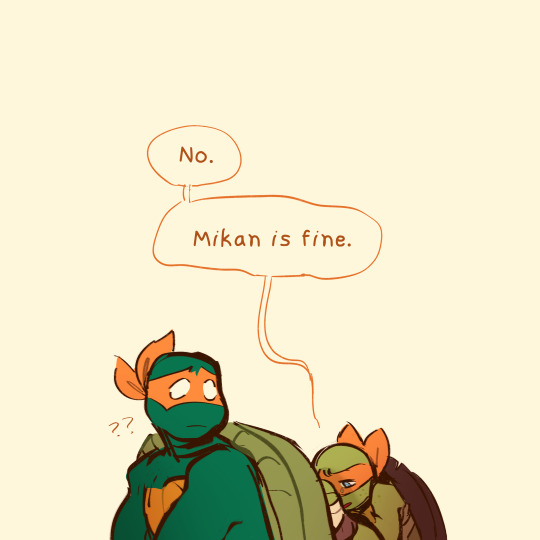
2003!Mikey and 2012!Mikey being silly older and little brother chronicles 🐢🤝🐢 Pt 4 - Masterpost
#(mikan is japanese for citrus or mandarin orange OR clementine :] )#OH WOW? LORE?? WHO COULD HAVE THOUGHT.....#btw 12!mikeys brothers are not dead or anything he just misses them...i wonder how they are keeping up...... :]#no one tell the 2003 bros that 12!mikey basically does know batman in person lmao#tmnt#tmnt 2012#tmnt 2003#tmnt mikey#tmnt michelangelo#tmnt leo#tmnt leonardo#tmnt raph#tmnt raphael#tmnt donnie#tmnt donatello#my art#doodles
7K notes
·
View notes
Text
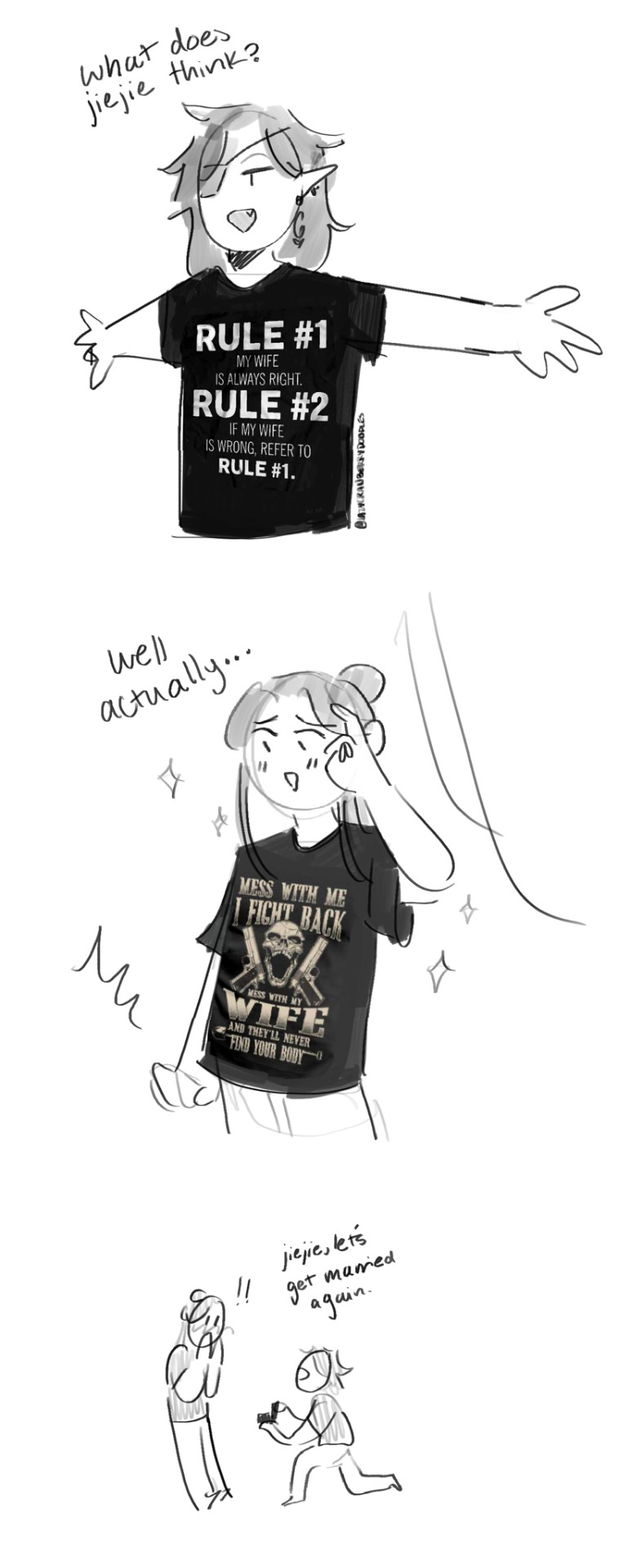
everybody go home. this is my magnum opus
#HELP THIS IS KILLING ME#the original version of this had hua cheng in a ‘i have a CRAZY wife she hates STUPID PEOPLE and LOVES DOGS and im NOT AFRAID TO USE HER’#but if hua cheng was at midwestern gas station number 472 in the novelty slogan tshirt aisle#she for sure would get some sort of ‘your wife (woman symbol) vs MY WIFE (wonder woman silhouette)’#or ‘trophy 🏆🏆 WIFE’#or possibly a ‘return to wife if lost’#or ‘i have a SMOKIN HOT wife’#or ‘im the BOSS til my WIFE gets home’#or ‘5 things you should know about my WIFE: 1. she is my queen 2. she is a bit crazy 3. she can whoop your ass#4. she says whatever she is thinking 5. mess with her and theyll never find your body’#or ‘i go to work so my wife can COLLECT SCRAPS’#or even at worst. ‘ my wife is the PRINCESS the mouse LOST’#xie lian would be initially embarassed. but you know her ass would be wearing a ‘proud PROPERTY of an AWESOME WIFE’ shirts @ heaven meetings#or ‘i’m not scared of ANYTHING - my WIFE is a CALAMITY’#which was sold as a metaphor for your wife being mean and powerful. but she wears it straight.#or even ‘im not GAY but my WIFE is’ lmfao#anyway.#tgcf#tian guan ci fu#hualian#hua cheng#xie lian#hualesbians#modern au#tgcf meme#my art#art#tgcf shitpost#lmao#mxtx
3K notes
·
View notes
Text
My mom (and my sister) said that both baby Stan and Ford are adorable but Ford is cuter and she likes him better and I think my heart is shattered.
This post is dedicated to my favorite kid Stanley panels:
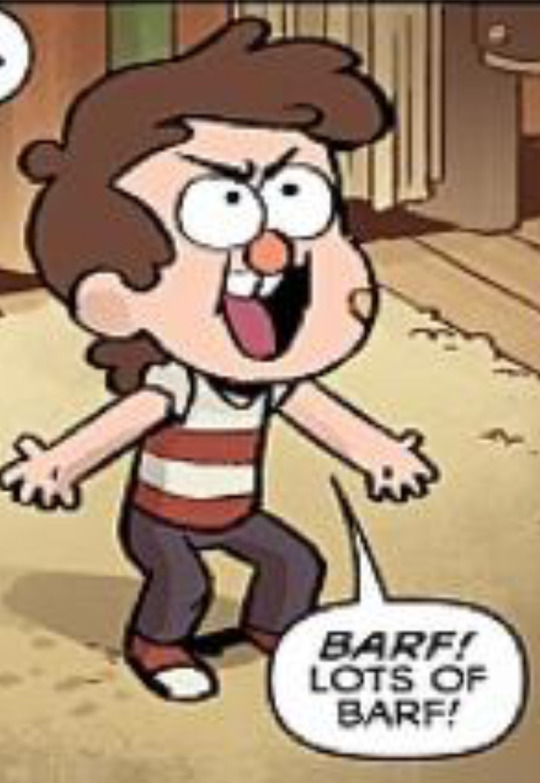
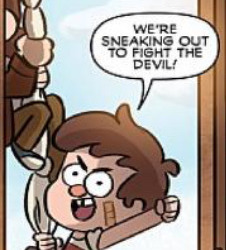
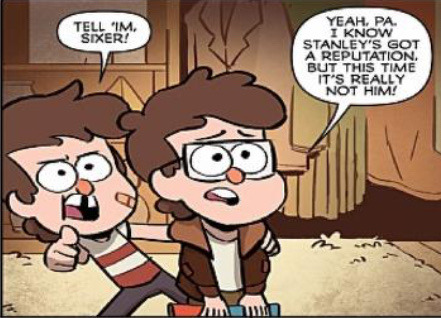
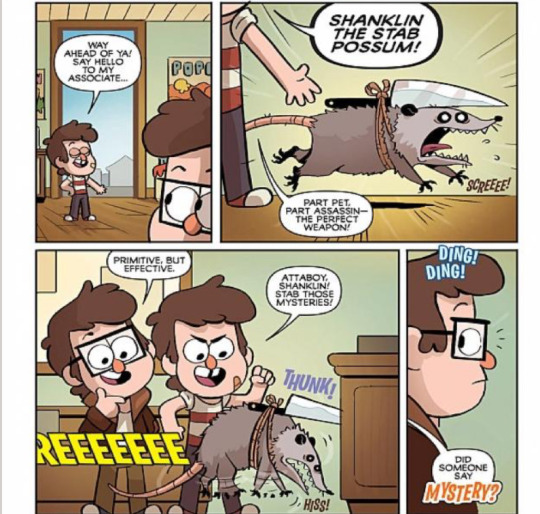
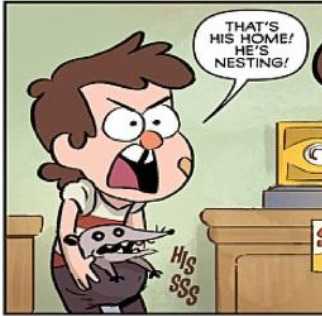
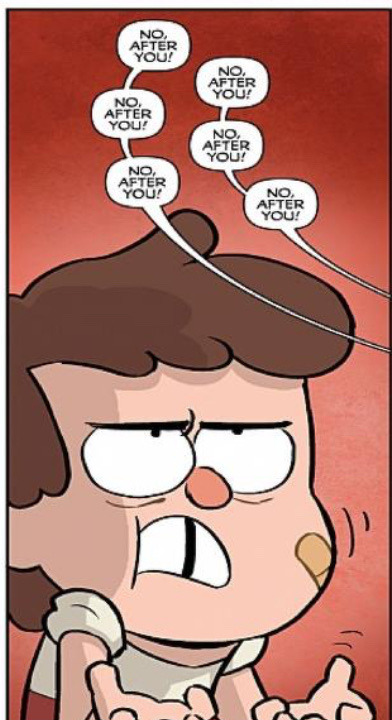
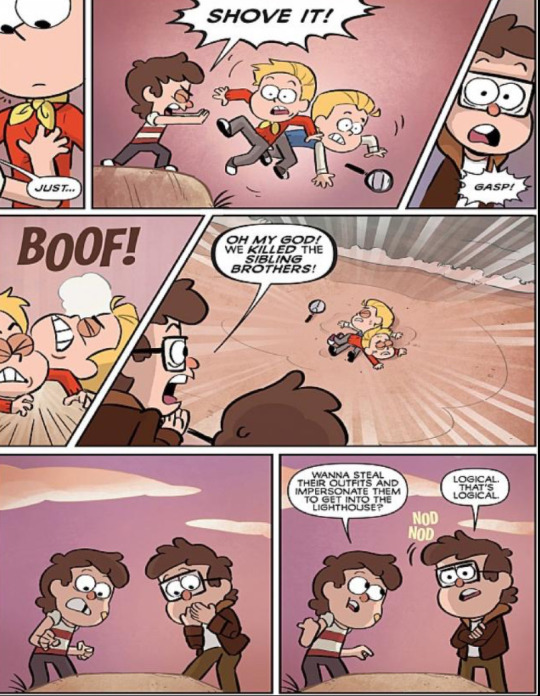
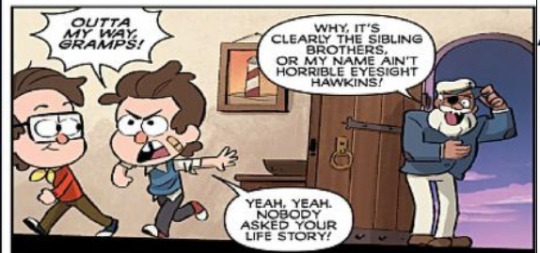
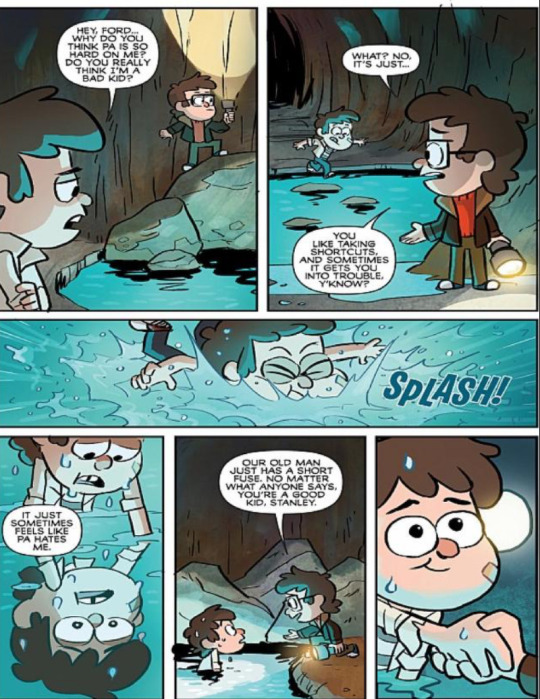
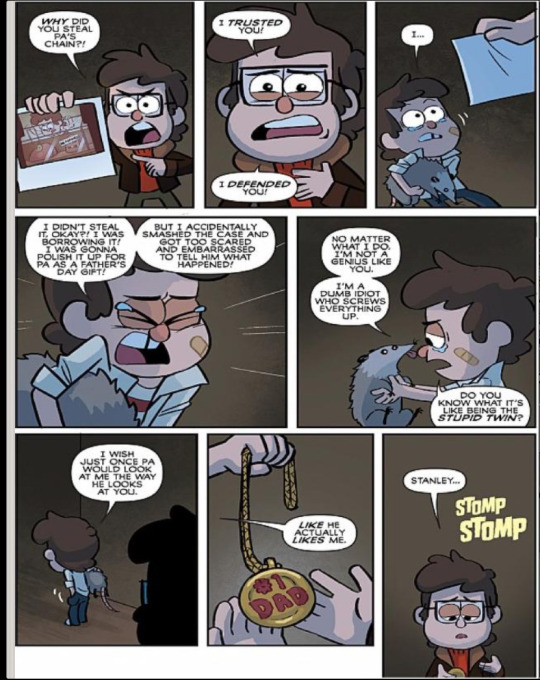
My mom didn’t even like him when I showed the one where he murders those two kids 😭😭😭 that’s the best part!!!
#gravity falls#stanley pines#stanford pines#I just wanna hold him and tell him he’s wonderful and creative and amazing#he’s trying his best#hes just a baby HES JUST A BABY#she doesn’t like that he’s a con man but MAYBE he wouldn’t have become a con man if he had a better support group 😤😤😤#I mean c’mon this kid had practically NO ONE#the only one there for him was his brother#and he was always over shadowed by his brother#everything he did in comparison wasn’t enough#and so yeah he takes shortcuts to catch up and then all he knows to do is lie and cheat because anything else he tried to do got shot down#HE WANTED TO DRAW COMICS DAMNIT#and really he was also pretty skilled in crafting! like foot bot and the boat he built with his brother#he probably just didn’t realize that that was impressive because of course it wasn’t his brother was doing things ten times cooler#YOU GUYS WILL NEVER UNDERSTAND HIM THE WAY I DO#😭😭😭😭😭😭😭😭😭😭😭😭#AND THIS HAS NOTHING TO DO WITH MY CHILDHOOD#WHERE I WAS *ALSO* OVER SHADOWED BY MY SIBLING AND FELT THAT I WAS NEVER GOOD ENOUGH#AND I’D GET IN TROUBLE FOR SHIT I DIDNT DO#AND WAS CONSIDERED THE SCREW UP#THIS HAS NOTHING TO DO WITH THAT.#SHUT UP.
1K notes
·
View notes
Text
As Good as Good Gets (DP X DC Snippet)
Richard "Dick" Grayson is the golden child. In the eyes of the public, and in the eyes of the league. Dick is a sweet, caring son, a man who went from being a sidekick to being a hero. The pipeline from Robin to Nightwing had many people applauding his dedication to keeping Gotham safe.
No one knew the full story, not truly. No one but Bruce Wayne himself. And maybe a certain butler. Many don't know that Dick only became Robin to stop him from hunting down and killing the man who killed his parents.
No one really knows about the harsh fights and arguments he has had with Bruce. The times when Dick would find himself cut off from the Wayne name for a week or so. No one knows that the first person Dick warmed up to was Alfred. Having been bribed with cookies.
Things weren't always this good, trusting, happy relationship between Bruce and Dick. It had been a rough ride, a complicated one. But that was okay, because it got better.
Dick stopped being so moody and angsty. He grew up, he learned, and he changed. He became an older brother, found people that needed him. Needed him in a way that the citizens of Gotham didn't need him.
His brothers like to call him annoying. A goody two shoes who Bruce trusted more than everyone else. They couldn't fathom how someone like Dick could be so stupid and bubbly at all times.
All times, except when shit hits the fans. Despite the name calling, despite coining Dick as the stupid Wayne. They all knew better. They knew that when it mattered, Dick Grayson always pulled through. He was a force to be reckoned with when needed.
The whole Wayne family was a force to be reckoned with when called for. It didn't have to be under the guise of costumes and vigilante acts. Whether he was Officer Grayson or Nightwing, Dick was a man with his morals and values.
One night on patrol as Officer Grayson, Dick found someone who needed that force. A force willing to protect and care for the innocent. The hurt. The damaged, yet still good.
It started like any other night. A call of shots fired by an empty warehouse. There was no sighting or knowledge of any rouges being there, so Dick took the call. Told the team he'll contact them if it seems more than just a civilian incident.
The warehouse was dark, reeked of copper and oil. It didn't take long for Dick to find the trail. The liquid he found looked like the person had been dragged before walking. There was a clear struggle, even with the mess and emptiness that was the warehouse.
That wasn't Dick's biggest concern. The concern lay in just how much blood there was. Too much for any normal person to lose and still manage to stumble through the warehouse.
It wasn't just blood. It wasn't that much, but Dick could spot the strangeness in the liquid. The mixed in green that had an eerily similar color and glow as a certain pit.
Without thinking, Dick followed the trail. Barely remembering to make contact with his family. Give them an update on what he found. Words telling him to stay put for backup went in one ear and out the other.
Something in Dick's gut was telling him he couldn't wait. He needed to find the source. Whoever was currently bleeding out in this warehouse. He silenced the comm, moving further through the dimly lit building.
Then Dick found it. Or more so, he found him. It was just a boy. A boy that reminded Dick too much of the youngest Wayne. A boy sat against a wall, looking pale and weak.
Red and green coated the front of the boy's shirt, arms wrapped tightly around his middle. An attempt to stem the bleeding. A puddle had already started to form beneath the boy, and Dick moved without thinking once again.
He quickly found himself kneeling beside the boy, hands carefully reaching out. Before Dick even touched him, the boy flinched. Eyelids suddenly opened, wide and terrified blue eyes landed on Dick's.
In just that one look, Dick knew what he had to do. The haunting, terrified, and pained look in the boy's eyes told Dick everything he needed to know. The boy was in danger. Someone had hurt this kid, and it was clear it wasn't the first time.
The boy struggled weakly against Dick's touch, terrified whimpers, and barely coherent pleas spilled from the kid's lips. It had Dick's heart aching, clear as day the poor kid has been through hell and back.
It took a lot of reassurance, gentle touches, and promises of help before the kid let Dick take a look at the bleeding wound. A promise on Dick's soul had been the final thing that earned him any semblance of trust. A strange promise, but Dick was willing to make it.
That concern turned to pure anger the moment Dick managed to pull the sticky shirt away from the wound. The sight of a Y-incision cut perfectly into the skin, stitches tight on the skin, but blood still leaking heavily from the wound.
It didn't take long for Dick to realize why. Despite the perfect surgical care of the wound, a good couple of stitches had broken. Leaving gaping spots for that red and green liquid to pour out of.
The boy was deathly silent, tears streaking down his cheek as wide blue eyes stayed trained on Dick. In that moment, Dick knew he had to help. Had to get the kid to safety, patch him up, and find out what kind of monster would do this.
It didn't matter if the kid was human or not. It didn't matter if the kid had special abilities or not. No one, absolutely no one, deserved to be vivisected.
The kid was shrouded in mystery, but that mystery only seemed to grow and become clearer when Bruce had entered the scene. The boy had tensed, eyes flashing a bright glowing green.
Lazarus pit green.
It set a pit of dread in Dick's gut. His mind brings forward memories of Jason. Jason, after his revival, after his dip in that cursed pit. The same flash that his brother would get if he got too angry. Too emotional.
As much as Dick wanted to focus on finding who did this, if it had any connection to Ra's al Ghul. He couldn't. Not when the kid tried to get up, to pull away as Bruce and the others made their way closer.
Right now, Dick only cared about making sure the boy was okay. Fixing those stitches, getting him a meal, and a warm bed.
He needed to get this kid someplace where he felt safe and secure. Comfortable and protected. Dick wasn't sure why. Maybe it was the promise he had made, but he wasn't letting anyone get to the kid.
That included his family. As strange as it seemed, Dick put himself between the others and the kid. Shooting them all a glare that they had only ever seen a handful of times.
Dick lifted the poor boy up in his arms, cradling the crying child close as he led the way out of the warehouse. Ignoring the questions or confusion coming from Bruce and the others. As Dick walked, feeling the trembling boy clinging to him, he made a rather obvious realization.
Maybe the eldest son really was more like Bruce than he expected. Just a few short moments the the boy, a boy that Dick didn't know his name, and he was ready to pull out adoption papers. To give the boy a safety he so desperately needs.
Give him the chance that Bruce had given him all those years ago.
#danny phantom#danny fenton#phandom#dc x dp#batman#dick grayson#nightwing#dp x dc crossover#dp x dc#dp x dc prompt#Dick really saw Danny and pulled a B99#“I've only known this boy for 10 minutes and if anything happens to him I'm killing everyone in this room and then myself”#bruce wayne#could easily mix in Ellie and Dan#after all Dick Grayson's gaggle of adopted kids is bound to grow#the others think they're free from the adoption impulse since Dick is picking up the mantel#not exactly for this idea; but I have these little idea of what the batfam adopts from the DP universe#like Damian latches onto the more animalistic characters; immediately falls in love with Cujo#wants to get to know everything about Wulf and Frostbite#meanwhile Jason latches onto Skulker because holy shit look at that arsenal; the two just sharing their best tips and weaponry choices#No explainations for the next onces cause I don't feel like typing em all out but...#Barbs with Technus and Ghost Writer#Tim with Johnny 13 and Nocturne#Alfred with Lunch Lady and Overgrowth#I could seriously go on and on and no I will not explain myself#(maybe)#queued post#every time I post one of these I'm always wondering where and how tf I picked the name#like I've got a draft right now called “Bullets & Babies” smh#picking out names are so hard but I got tired of just putting “DpxDc random snippet/prompt” as the titles lmao
671 notes
·
View notes
Text
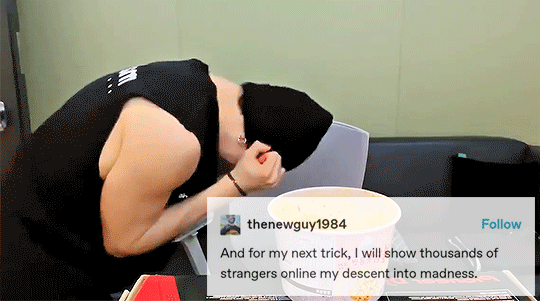
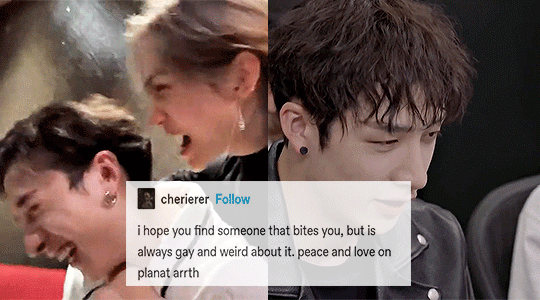

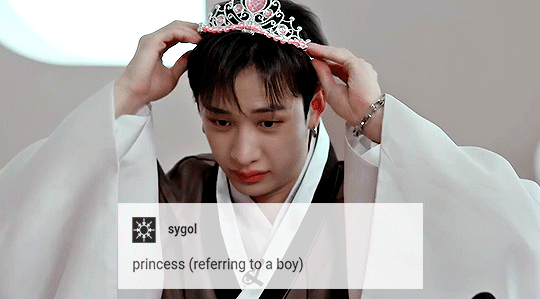
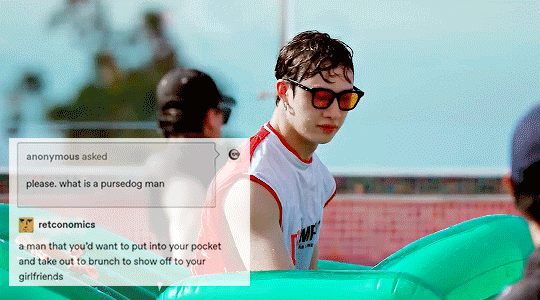
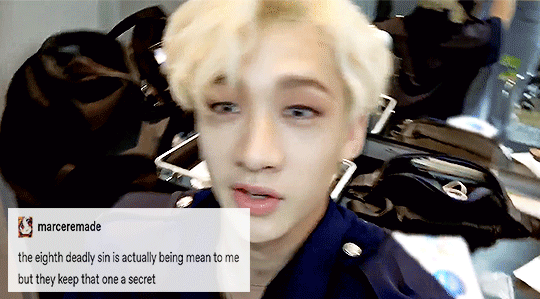

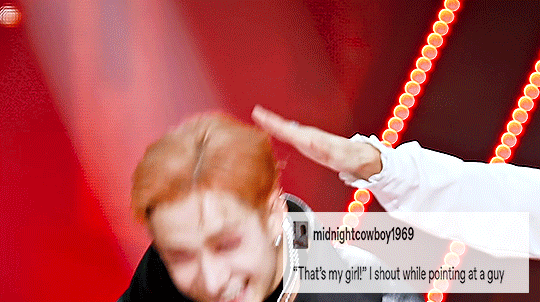
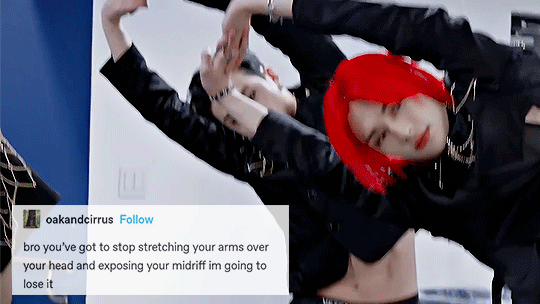
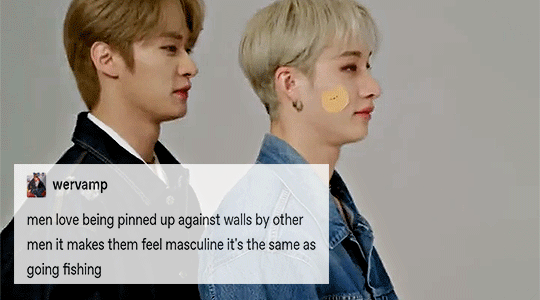
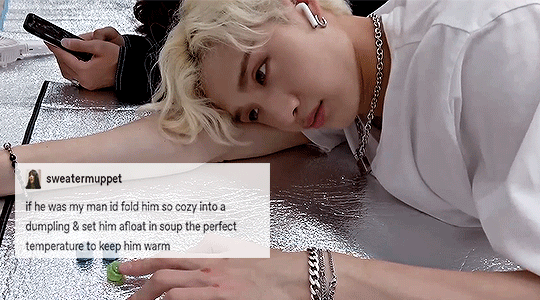
#my baby my love my everything i hope u have a day as wonderful and sweet and lovely as u are#stray kids#bang chan#bang chan gifs#stray kids gifs#skz#skz gifs#my gifs#cbbc2023#ah. not to get sappy in the tags since im already using all my characters to get sappy in his bubble but. hm. he's very very very important#to me. kind of like. extremely special.#just. im so bad with words but idk if id be here without him and if i was id be deeply deeply unhappy? so im always gonna be grateful to hi#and his music and his company and his care#he's just so kind and sweet and deeply deeply caring and i know birthdays aren't special to him but i hope he gets to eat good food today#and spend time with people he loves & who love him in return and just has heaps of fun. today and every day i just hope he's happy#if he's half as happy as he makes me on the daily then i never have to wish for anything else#um. anw. silly little post for his day that did not warrant all that gut spilling. happy birthday my guy of all time. i love you
3K notes
·
View notes
Text
Actual Ultimate Classpecting Guide
For real this time.
Buckle up, this is a really long one. For everything that's posited, I can provide textual evidence; that being said, I'm not going to be including the textual evidence within the essay itself, because it's already long enough as-is. As such, please feel free to ask for clarification or sources on any assertion, and I'll do my best to provide.
Before we begin, there's some things to discuss about how we're going to be approaching classpect in the following essay. In numbered list form for our short attention spans:
1. There is a concept Hussie talks about multiple times in his book commentary, "personality alchemy" - the idea that there are these "platonic ideals" of certain characters, which can be mixed and matched with others, in order to create new characters. The examples he gives are of how Eridan was a proto-Caliborn, how Kanaya has shades of Jade, how Nepeta was a proto-Calliope, and how Sollux and Eridan have shades of Dave in them. Classpecting is fundamentally a form of this personality alchemy:
2. Class describes the character's arc and emotional hurdles, while Aspect describes the character's base personality traits by which this arc is experienced.
3. For example, all three Seers struggle with hubris: Rose's need to be the smartest person in the room led to her being manipulated by Doc Scratch, Terezi's obsession with meting justice led to her engineering a situation where the only option was to kill Vriska, and Kankri's desire to be seen as a spiritual leader amongst his friends led to him furthering their divisions and harming them.
Then, when their pride is shattered, they cope by inflicting willful self-blindness: Rose turns to drinking herself stupid (the opposite of Light's sway over knowledge), Terezi gets down with the clown (the opposite of meting out Mind's justice, as it's a Gamzee W), Kankri goes celibate (Blood L) despite his clear romantic feelings for certain teammates.
4. As for Aspect: note how all three Life players share the personality traits of optimism, stubbornness, and obstinacy. All three Breath players share an immaturity and naïvety, and are quite frankly irresistible to people for some reason. All three Light players share a need for the spotlight and a tendency toward long-windedness and persnicketiness. So on and so forth.
What's interesting is, if you start analyzing characters that share Classes and Aspects, these specific types of similarity crop up over and over - all our Knights struggle with insecurities and facades, both our Bards have a crisis of faith. All three Breath players have an aspect of immaturity and childishness to their characters, and all three Light players are deeply concerned with appearing intelligent and feeling important.
5. As a result, this guide is NOT intended for classpecting real life people, because we are complicated, we contain multitudes, and we don't have arcs. This is primarily an analysis of what Class and Aspect mean in Homestuck based on textual evidence, because I genuinely believe that you can basically figure it out if you read carefully.
6. Duality, and the idea of "equal and opposite," are major themes within Homestuck - Prospit and Derse, Skaia (described as a crucible of birth and creativity) and the Furthest Ring (the literal afterlife). Which classes are involved in an Active/Passive split, and opposing Aspects, are the same way. This is the primary method I used to determine the Active/Passive pairings and opposing Aspects. After all, as Callie describes, both Thieves and Rogues are classes "who steal" - so, too, do I try to unify Classes by a common theme, even if they diverge wildly in how that theme is expressed (as Thieves and Rogues do). In the same way as the opposite of "up" is not "apple," but "down", because "up" and "down" are both fundamentally concerned with relative vertical position, so too can be defined concepts like Breath and Blood, Hope and Rage, Light and Void - as well as the reasoning behind Class pairings like Heir and Page, Maid and Knight, and Seer and Mage.
7. Descriptions for both Class and Aspect are left deliberately vague and up to interpretation within the comic itself, and this is by design: the actual manifestations of an Aspect can vary wildly given the Class, and even individual person, that it's tied to. Calliope even makes note of the fact that, under the right circumstances, someone can manifest effects that appear to be the opposite of their aspect. She's also careful to couch her language in "may" and "can" - because these concepts are intentionally somewhat nebulous and malleable. As such, while this guide certainly lays down what can be gleaned and inferred from the text, do note that Homestuck runs on a soft magic system, and as such, nothing stated is firm, 100%, must-always-be-this-way - just an overview of what we've seen.
8. There is often great overlap between Aspects, Classes, and Classpects - which Calliope herself notes. Heart and Blood are one of the most salient, as they both have a fixation on relationships, and Calliope mentions that under the right circumstances, a Classpect may even be able to manifest what appears to be the opposite of their Aspect. Again, Homestuck operates on a soft magic system, so this is a feature, not a bug.
ASPECT
There's a little less to say about Aspect, not because it's less complicated, but because "base personality traits" are much more nebulous compared to Class's sway over character arc. Still, Aspect represents the fundamental way a character is, and thus, color every interaction that character has. There's a reason Ultimate Selfhood is sought through Aspect, not Class - Aspect is the core of the character's being, what makes that person that person.
That all being said, Class has major sway over how an Aspect manifests, and certain classes can even invert the Aspect and even the character's role in the party. As such, these descriptions must be parsed carefully in relation to Class. Moreover, due to the soft magic system, there is at times overlap between unrelated Aspects, which can also be exacerbated by Class - Heart and Blood being the most obvious in this regard. Still, overall, you'll find the Aspects to be fairly distinct from one another.
Please also note that every Aspect can deal with its literal counterpart by default - Light players can wield lasers, Breath players can wield the breeze, et cetera. Because this kind of goes without saying, and because the non-literal stuff is more interesting to discuss, I'm not really going to go into too much detail about the literal qualities.
SPACE / TIME
Space and Time are both concerned with physical reality, goals, and the way one approaches them.
Space is associated with "the big picture" - with recycling, reproduction, and the interconnectivity of all things. The aspect also presides over the enjoyment of the journey over the destination - Space players serve as reminders that the present moment is as important as the end goal. Space is often a more passive Aspect, being the stage upon which the story is set. They're the hosts of the party, and the one who marks the ending.
Its players reflect these tendencies, often being feminine, with penchants for life-giving acts such as gardening. Their personalities tend towards frivolity and silliness, finding it difficult to stay on-topic or bring full gravitas to serious situations. Perhaps a better word would be "distractable;" when the aspect is so concerned with all things in connection with each other, it's easy to lose track of details, and it's easy to enjoy things simply as they come. Space players tend to be kind, patient, and forgiving, which is a strength as much as it is a flaw; it's easy for malicious actors to take advantage of this compassion, or for the Space player to find themselves in a poor situation by being overly permissive. They can easily be painted over by stronger personalities, and tend to struggle with romantic relationships, as they attract many with their kind and giving natures, and few are naturally so considerate of the Space player in turn.
A Space player's struggle lies in finding the strength to assert themselves, picking out the good from the bad, weeding the garden so it can flourish and thrive.
Time, in contrast, is associated with "the little things" - with details, minutiae, and processes. Time presides over the struggle toward something greater, the endurance of hardship with an eye on the prize - the destination over the journey. Time players are the ones keeping track of the tasklist, marking off each item as it reaches completion; they are the tireless workers keeping the whole engine running.
Time players, thus, are ones whose lives are marked by struggle. They are highly goal-oriented; in contrast to how Space players can easily move from goal to goal, task to task, Time players feel bound to see things through to the end, finding satisfaction only when they've achieved their desired result - and only until they come across the next goal in their journey. A Time player isn't happy without a goal to work towards, a craft to polish, a prize to win - but this driven nature can easily be its own downfall, as it leaves little room for the player to admit to their own shortcomings, or ask for help from others. Moreover, their focus on minutiae can leave them blinded to the bigger picture, and it's easy for a time player to fall to despair, able to do nothing more but spin their wheels. They're prone to directionless anguish, frustration, and resentment towards the seeming futility of their actions, becoming destructive and defiant even when it doesn't serve them to do so. In the worst case scenario, detach entirely, coming to a standstill.
A Time player's struggle lies in finding peace with themselves, such that they can enjoy the fruits of their own labor - labor whose rewards only multiply when the cause and methodology become clear.
BREATH / BLOOD
Breath and Blood are both concerned with directionality, interpersonal relationships, and autonomy.
Breath is the Aspect governing freedom, liberty, and independence; it is a force that breaks shackles, clears out social norms, and refutes "the rules," whatever those rules may be. Breath players can't be tied down, whether by physical bonds, societal rules, or even the ineffable forces of the narrative itself. They are leaders of example, pioneers, and trailblazers, opening new paths for their teammates to follow.
Breath players are goofy and gullible, often with hearts full of childlike whimsy, naivety, and even immaturity. They are friendly and well-meaning, fond of simpler things, and easily swayed by others. They approach the world with a sincere earnestness, which is not always well-received. Something about this sincerity seems to make Breath players irresistible to others, and they often find themselves the subject of romantic attraction. However, in this childishness is also the great pitfall of many Breath players - their natures are naturally conflict-averse, and egotistical the way a child can be, failing to see beyond themselves. They can be incredibly callous when not considering the consequences of their actions, or the viewpoints of others. Their easy-come, easy-go natures make it difficult to focus them towards a goal, and it's easy for them to simply allow themselves to be tossed around by circumstance and the whims of others, or to simply run away from their problems entirely - never confronting their own responsibility or fault for a situation, passing along the blame.
A Breath player's struggle is letting themselves mature - letting themselves take responsibility, and understand that their actions have consequences for others. Only then can their breeze blow in the party's sails, aiming towards victory, breaking through all obstacles to reach it.
Blood, in sharp contrast, is the aspect that governs bondage, contracts, and interdependence. It is a force that binds. Under Blood's sway are not only romantic entanglements, but familial, friendly, and societal ones as well. This aspect sees overlap with Heart, but the division is this: Heart concerns itself with feelings, and Blood concerns itself with compatibility. Blood players are diplomats, forces that remind us all that we are more similar than we are different, and that that similarity should bring us together when we are on the verge of pulling apart.
Blood players, reflective of their Aspect's association with bonds, tend to be neurotic and obsessive. They have a tendency to over-examine and overthink, constantly fretting over the infinite and infinitesimal variables that influence the shape of society and interpersonal relationships. However, this judgmental nature stems from a deep well of idealism and empathy; Blood players can't help but care about others and wish for the best for them. In a way, this makes them one of the most mature members of the team, capable of cutting through to the core of other peoples' interpersonal issues. Unfortunately, their prowess does not extend inwards, and their assessment of themselves is usually direly incorrect - all the worse because Blood players always feel responsible for those around them. Blood, being the Aspect concerned with interdependence, is the weakest one when all alone. Thus, it's easy for the Blood player to wind up a nag - desperate to make sure everyone is moving according to their vision, they'll fuss and bother and interfere and boss people around until everyone else gets sick of them. It's easy for them to wind up pariahs of their own making, severing their own ties with others by their efforts to establish them.
A Blood player's challenge is of learning how to turn that empathy and honesty inwards, to calm down and let themselves enjoy the presence of others; only then can they come to know how to build something stronger and better.
LIGHT / VOID
Light and Void are both concerned with knowledge, ontology, and "narrative relevance".
Light (as well as its counterpart) are perhaps best understood through the lens of "narrative" - this idea that, of all things that do and don't exist, and all events that do and don't happen, only the ones put to page are "relevant". Thus, Light is associated with knowledge and luck - that is to say, it's associated with the knowable, the objective, and the concrete, and the ability to determine "important" events. Light players have read the book they're participating in, and able to serve as luminary guides from one plot point to another, lighting the lampposts for others to follow.
Light players, naturally, are erudite and educated, possessing keen intellects and cunning minds. They are fond of knowledge itself, of markers of status and prestige - whether that's wealth, the adulation of the masses, or a massive library. They harbor a desire to be important, to be seen, to be acknowledged, and are happiest when they are looked up to. Conversely, they deal poorly with being looked down upon. Their confidence transmutes easily into hubris, and they struggle with having that pride challenged. As such, they tend to be volatile and unpredictable, quick to retaliate against those who threaten their egos, or obsequious to those whose acknowledgement they desire. Their desire for the limelight can quickly spell disaster for those around them, who are reduced to supporting characters in their minds. Craving so much external validation, they're often blind to what would actually make them internally happy.
A Light player's challenge is of coming to terms with their own limited reach, and allowing themselves to shine not for their own desire for importance, but for the betterment of the world in which they live.
Void, in contrast, is the blank spaces between the words. That which is secret, subjective, unknowable - these are Void's domain. It's associated with taboos and hidden things, sexuality and pleasure. It's also associated with the empty canvas - the blank space before creation, and the oblivion to which creation is eventually destined for. Thus, it stands for infinite possibility, though the collapse of those possibilities into a reality removes that reality from Void's domain.
Thus are Void players ever cosigned to the background, though this generally suits them fine. Void players are very self-possessed. Where Light players tend to exaggerate and complicate, Void players are honest and simple, preferring straightforward solutions. They don't tend to think very hard, instead letting intuition and emotion guide them to where they want to be - which makes them one of the more stable and reliable personalities on a team. However, this simplistic, feelings-driven approach often leads to complications and unforeseen consequences, and very easily to irrelevance, with which Void is so closely interlinked. A Void player's reliance on emotion and intuition can result in overindulgence of pleasure, to the active detriment of the party's goals or the Void player's self-improvement, leaving them lost and irrelevant, unable to act.
A Void player's challenge is in resisting the call of the Void's temptations, instead dragging the Void behind them, kicking and screaming, to where it can be of use.
MIND / HEART
Mind and Heart are concerned with what it means to be a sentient being, with identity, and with why we do what we do.
Mind is the Aspect associated with logic, rationality, karma, ethics, and justice. To a Mind player, they "are" because they "think". They are keenly aware of the consequences of every action, and well-versed in cognition and behavior, such to the point of manipulating others with ease. Deeply concerned with the "effect" of cause-and-effect, Mind players are always cognizant of debts and credits, where justice is owed and where it has been over-meted, and their subtle machinations culminate, like well-placed dominoes, in grand finales.
Mind players are schemers - it's in their nature. They have a tendency to view the world as a puzzle or game, with themselves and the people around them as pieces on a board, and set as their standard rules the laws of ethics and karma - owed debts and overhanging credit - guilty and innocent. Mind players are wickedly cunning, and have an high success rate with every scheme they commit themselves to, but the grand downfall of all these tendencies is that they tend to lack in a sense of identity, and have a poor grasp on their own emotions or desires. While they may know how to provoke a desired reaction, they don't know how to change someone's mind. They often find themselves grappling very painfully with their own selfhood, with feelings of emptiness, inadequacy, or uncertainty; this often leads them to seek codependent relationships, hoping somehow that they can find the validation they need externally, not realizing that they're deepening their own fragile self-images.
A Mind player's challenge lies in tempering their natural understanding of karma and justice with kindness and empathy - not just to others, but to themselves, and using that enlightened understanding to lead others forth.
Heart, then, is associated with feelings, motivations, intuition, the soul, and the self. To a Heart player, they "are" because they "feel" like they are - and they're keenly aware of the multitudes that are contained within themselves. Deeply concerned with the "cause" of cause-and-effect, they're drawn to desires, those of themselves and of others, especially where strong feelings are concerned. Heart players are gifted with an intuitive understanding of those around them, both their good and bad qualities, and are tasked with the grand task of bringing out the best.
It stands to reason, then, that Heart players have a firm grasp on who they are and what they want. For the same reasons, it's difficult for a Heart player to truly hate or condemn another person, because they are so adept at understanding them. However, this understanding comes with a price - because the Heart player is so aware of themselves, they can't escape their own worst traits - nobody self-loathes as accurately as a Heart player can. Nor can they ever truly be untruthful with another, making them poor manipulators. Capable of presenting a different facet of themselves as the situation calls for it, certainly, but just as it's impossible to lie to a Heart player, who always knows how someone really feels, it's impossible for a Heart player to lie to themselves. With this sincerity comes vulnerability, and vulnerability often brings with it pain; Heart players have a tendency to withdraw from others after being hurt too often, finding it easier to be alone and silent about their feelings than to deal with the pain of rejection.
A Heart player's challenge is in gaining the confidence to be open with others, to weather the pain of rejection, and let themselves share their gifts, that others may learn to share theirs.
LIFE / DOOM
Life and Doom are concerned with outlook, with journeys, and with trials and tribulations.
Life is an aspect concerned with healing, growing, and improving. It is associated with beginnings, optimism, and positive emotions. The very essence of Life lies in its healing abilities, in this idea of overcoming the odds and triumphing over hardship and difficulty. Life is action, movement, and motion, and its players can scarcely hold still. Life will find a way - and Life players harbor the same immutable belief; they are the most stubborn weeds in the garden, the cockroach that survives the apocalypse, and the beating heart that refuses to stop.
Life players tend to be optimistic and confident. They are self-assured individuals, with a stubborn belief that good things are on their way, and any hardship they face is not only temporary, but something that can be overcome. They can find the silver lining in any cloud, and enjoy themselves under any circumstance. They love to nurture, to care for others, though this love has a tendency to be one-sided. Indeed, Life's stubborn nature is its players' greatest pitfall; their persistence easily becomes obstinacy, and their confidence can become condescension. Their self-assured nature easily becomes egotism, and they can have great difficulty grappling with those who don't share their views - even coming to oppose those who bring emotional pain and suffering that can't be easily fixed. It's very easy for a Life player to decide another person isn't worth their attention, and opt to leave them behind - after all, Life has to move forward, no matter what it tramples in the process.
A Life player's challenge is in accepting the merit in taking a pause to consider unpleasant words and alternative viewpoints, in trying to understand the actual problems instead of imposing their own will onto others, so as to better focus their healing energies.
Doom, then, is the aspect concerned with death, with rest, and with endings. Doom is associated with suffering and with negative emotions, with peace, with sleep, and with dreams. Doom players have a natural penchant for prophecy, and are often dual dreamers, able to take advantage of both Skaia's oracular clouds and the Horrorterrors' voices over Derse. All things must eventually come to an end, and not all times will be good; in these troubling times, Doom players shine, as they are the guides who call the murk home, and know best how to navigate rough waters, course-correcting until the storm passes.
Doom players tend to be deeply pessimistic. They experience, to a much more magnified degree than others, negative feelings and impulses, and it's difficult for them to see the world without seeing its flaws, first and foremost. They are not healers, but commiserators, those who understand greatest that sometimes there's no way to deal with tragedy but to simply sit with it and wait for it to pass. The counterpoint to Life's insistence on breathless positivity, Doom is a reminder that pain, grief, sadness, shame, and guilt are not unnecessary things - in fact, excising them can lead to terrible consequences. Doom players are the universe's martyrs, often taking it upon themselves to course-correct, to sacrifice themselves in order to give others a chance to continue on, to avert a terrible fate. Unfortunately, this tendency also brings with it a tendency for Doom players to wallow in misfortune, or worse, to take themselves out of the picture, giving up entirely on seeing a better ending.
A Doom player's challenge is in rising above the melange of suffering and pain, to grasp personal peace, and to fill their lives, if not with happiness, then with meaning.
HOPE / RAGE
Hope and Rage are concerned with permission, and are the lens by which we define reality.
Hope is described by Hussie in the book commentary as being "framed as the most powerful aspect" because it is, literally, an aspect that defines reality. Its specific ability is lies in reducing the "fakeness attribute" of something, thus making it "real". Hope is associated with convictions, with idealism, with faith, order, holiness, and, of course, with magic - which Hope turns real. Hope is permission itself - a reality-breaking ability to look at the world and decree that it must be another way, a way in which the Hope player believes it ought to be.
Thus, Hope players tend to be hard-headed zealots. Their inclination towards powerful beliefs makes them very difficult to dissuade from a path they've set their minds to, and their specific suite of abilities makes them terrifyingly likely to make their vision come true. Hope players are usually not particularly cunning, nor particularly intelligent, nor even particularly empathetic. Given the Aspect's focus on conviction and faith, it's usually very difficult for Hope players to notice anything occurring beyond their own minds and feelings. Thus are Hope players hopeless optimists, hopeless romantics, and hopeless in general - usually not particularly well-liked, for their inflexibility, for their lack of empathy, and for their dearth of wit. However, their ability to define reality does not leave them when their beliefs are faulty (which they often are, given Hope players are not particularly introspective, either), which is what makes a Hope player so dangerous. Setting them on the wrong path, or breaking their Hope in twain, can result in disastrous consequences, as - one way or another - what a Hope player believes in comes true.
A Hope player's challenge is in seeing beyond themselves, letting others help guide their vision to something newer and more beautiful.
Rage, then, is the power of denial. If Hope reduces the "fakness" of a thing, then Rage reduces its "realness". Rage, too, is a means of defining reality, in this case taking a torch to the aspects of reality that it rejects. In more passive Classes, this works in subtler ways, stoking others towards destructive fury. Rage is associated with anarchy, chaos, revolution, destruction, anger, and nihilism. A Rage player will not suffer a world that does not satisfy them, breaking it to pieces, such that something new can take its place.
Therefore, Rage players are prone to harboring anger and resentment, discontentment with the status quo, and faith only in that what currently exists must somehow be dismantled. However, unlike Hope players, who can't help but be pathetically sincere, Rage players grasp that their natural inclinations are bothersome to others, and often try to mask and hide their embitterment and anger. This, ironically, leads to further ostracization, as others can tell they're being inauthentic. This only further compounds their sense of alienation, and drives them further into smoldering resentment; in the worst-case scenario, the Rage player turns that rage out indiscriminately, deciding that there is nothing worth fighting for - only unpleasant things to be brought to ruin. This makes Rage players sound volatile and dangerous, and they are - but the same fury that moves them is the fury that ignites revolts and tears down oppressive regimes, a necessary and vital well of energy and momentum. It takes careful handling to ensure that the team's Rage player can channel this energy towards righteous causes, rather than marking all as a target for their destructive ire.
A Rage player's challenge is in learning to be authentic and true, and to allow this to release the pressure of their mounting ire, such that it can be converted into productive, rather than destructive, energy.
CLASS
As previously stated, Class governs a character's character arc - the character's starting circumstances, whether their conflict is primarily internal or external, and what major aspect of their Aspect becomes a hurdle for them to overcome.
In the same way an Aspect's sways tie into the character's base personality, the character's Class abilities tie into the kinds of struggles they face, and have great influence on how their Aspects manifest.
That being said, a character - and their Class - are always subject to their Aspect, as their Aspect is tied fundamentally into who they are. Thus, it can be said that a Light player will always have an affinity for knowledge and provide Seer-esque guidance even when not in a Seer role, a Doom player will always have prophetic abilities even with a non-prophetic class (note that Mituna, an Heir, still had prophetic visions, despite those generally being the realm of Mages and Seers), and a Life player will always have a penchant for healing, even paired with a destructive Class like Prince or Thief (the Condesce, after all, could still extend life; a Prince of Life would likely manifest not as one who causes plants to wither and die (this would actually suit a Prince of Doom), but one who destroys in the way of nature overtaking an abandoned shack, or a forest breaking down a body).
This means that when a character's Classpect inverts their Aspect, it doesn't mean that they suddenly become a hero of the opposing Aspect - rather, it means that, at their very worst - at the nadirs of their character arcs - they will lean so much into their Aspect's worst traits that it will superficially appear as the opposite, when all it really is is an absence of themselves. Dave, a Time player, usually so attentive to detail (despite his disaffected facade, he's always paying rapt attention to Karkat's rants, and noticing all the clues pointing to his destiny of defeating LE), at his lowest emotional point (arguing with Grimbark Jade after sobbing about his lost childhood whimsy), states that he doesn't think Lord English is that big a deal, and never even did anything directly bad to him or his friends - when he was literally directly haunted by LE via Cal his entire childhood. Similarly, Rose drinks herself stupid in order to cope with her mother's death.
Note how, superficially, this almost appears to be an invocation of Space's "big picture thinking," its passivity and permissibility, or how Rose's case appears to be Void's tendency to indulge in vices and pleasure - but they're not. Time's worst traits superficially resemble Space, Light's resemble Void, and vice versa - Grimbark Jade is the Condesce's taskmaster, and Porrim at her worst was as much of a nag as Kankri, trying to do a Time player's managerial job. Horuss and Equius at their worst won't shut up and won't stop talking over their partners. So on and so forth.
Finally, Calliope tells us a couple things about Active/Passive pairings. The first is that Calliope introduces the idea of paired classes with the idea that both Rogues and Thieves "steal" (and later, that both Princes and Bards "destroy"). This presents the idea that both classes can be roughly summed up with the idea that every pairing can be summed up with a common theme.
The second is her description of what makes a Class Active versus Passive - that Active Classes move their Aspect to benefit themselves, whereas Passive Classes allow their Aspect to be moved in order for others to benefit. In a way, they're like active and passive voice in grammar (to tie in with the way Classes and Aspects are so tied to ideas of narrative and character arc) - an Active Class performs their Aspect, and a Passive Class allows the Aspect to be performed "by others" (the famous piece of advice regarding telling the two apart being that a sentence written in passive voice can have "by zombies" tacked to the end of it - eg, John is attacked "by zombies", as compared to active voice - John attacks).
Thus, the Class pairings, along with their basic themes, are as follows:
KNIGHT - / MAID +
"One who controls."
Knights and Maids are paired together through two key factors: the first is that they both hold leadership or managerial roles; the second is that both classes carry the connotation of serving a Lord. Fittingly, they are both struggle with the control of malicious forces - Knights with prophecies indicating their role as heroes, Maids with direct usurpation by malicious forces.
PAGE - / HEIR +
"One who inherits."
Pages and Heirs are paired together because they both fundamentally deal with the great inheritances placed before them. Pages can come into incredible, limitless power - but they must struggle and work hard for it; Heirs begin the game in societal comfort and wealth, and must learn to defect from their decadence.
THIEF - / ROGUE +
"One who steals."
Thieves and Rogues are highly adaptable, as Thieves are capable of fantastic on-the-fly adaptation, whereas Rogues have an infinite toolbox at their disposal. They are both provocateurs, shakers of the status quo, though the Thief does so for personal gain, while the Rogue does so to right injustice.
MAGE - / SEER +
"One who guides."
Mages and Seers are tied together by the gift of prophecy and future sight. Seers are privy to the endless branching paths that the future may take, while Mages are gifted with the ability to outright determine a future that will certainly happen, appearing to be prophecy.
WITCH - / SYLPH +
"One who changes."
Witches and Sylphs are individuals blessed with great magic, but poor judgement. Sylphs heal and nurture, but are drawn to those with strong desires, and enable them to cause great harm; Witches, meanwhile, possess strong emotions, which they often use as moral guidance, for better or worse.
PRINCE - / BARD +
"One who destroys."
Princes and Bards are representatives of society - the one who determines its course, and the one who recounts its passing. Princes suffer from a toxic overabundance of Aspect, and are prone to spectacular meltdowns, whereas Bards are always poised for a crisis of faith. Both are responsible for catastrophic failures - but also breathless victories.
INDIVIDUAL CLASSES
KNIGHT
"One who controls [Aspect] or controls using [Aspect]."
Knights are frontline warriors, rallying points behind which the party falls into line. Although they are often leaders, just as often, they are logistical planners, strategists, or simply the team's beating heart. They are almost always thrust into positions of narrative significance, often carrying grand destinies or even outright heroic prophecies on their shoulders. The are the party's rallying force, its center, and a guiding light - the one to lead the charge, behind which the party will follow.
The primary character struggle a Knight will have is with crippling insecurity. Knights are prone to self-loathing and imposter syndrome, and will often adopt a façade in direct opposition to their aspect (ie, their fundamental personality) in order to cope with their feelings of inadequacy. Thus, their relationship with their aspect becomes love/hate - though they're naturally drawn to their aspect, and even naturally skilled at utilizing it, they have a tendency to become their own worst enemy, as their insecurities make them push their façades, and their façades distance them from their aspect.
"Controlling their Aspect" means that the Knight has easy access to their Aspect, wielding it like a tool or weapon - for good or for ill; "controlling using their Aspect" is what grants Knights their leadership abilities, able to dictate how others ought to act in accordance with the Knight's Aspect - whether their understanding of their Aspect is high or low, whether their advice is good or bad.
Therefore, at their worst, a Knight will fall prey to their insecurities, retreating into their facades, rejecting their Aspect, which will allow disharmony or misuse of it to proliferate throughout the team. They may even wind up deliberately twisting their Aspect's presence within the team so that they never have to be confronted by it; these distortions ripple outwards and eventually culminate in major catastrophes, all on account of the Knight's negligence.
But at their best, a Knight is a shining beacon and guiding light; when they come to terms with themselves, and allow themselves to be comfortable in their own skin - when they no longer allow themselves to be ruled by their insecurities and anxieties - they ensure that their aspect is harmonious wherever it appears throughout their party, and can wield it expertly as a weapon, as if it were their own flesh and blood.
MAID
"One who allows control through [Aspect] or allows [Aspect] to be controlled."
Unlike Knights, which take positions of frontline prominence, a Maid is a managerial presence in the backlines, though no less crucial for the smooth functioning of a party. Just as the invisible hands of the hired help keep a household running, the Maid will be called upon to provide vital services to keep the game stable, even if those services are more noticeable by their absence than their presence. Maids are often the party's unsung heroes or even shadow leaders, tugging at invisible strings, fingers on the pulse.
A Maid's primary character struggle will be that of escaping oppression. Maids tend to start the game in positions of subjugation or subservience, especially to malicious forces, and their abilities often end up being exploited to serve their masters' ends. Therefore, one may even have the impression that a Maid is ruled by their aspect, held prisoner and slave - at least until they're able turn the tables.
"Allowing their Aspect to be controlled" means that Maids are capable of directly dispensing their aspect unto others - a Maid of Time can dispense time unto foes, pausing them in their tracks; a Maid of Life can grant so much life that they can revive the dead. Their boons are great and direct, straightforward in a similar manner to Knights. "Allowing control through their Aspect" grants them their uncanny managerial abilities, as their aspect dictates the realm in which nothing occurs without the Maid's knowledge or permission, a realm made available to whomever the Maid's allegiance lies with.
Thus, at their worst, the Maid becomes a saboteur. Exploited by malign forces, their abilities to allow control over others through their aspect, or control of their aspect, makes them perfect vehicles by which their aspect can be hijacked or usurped, and made to turn against the party, and they often find themselves placed into these positions through no fault of their own. It takes the party banding together to shake off the forces that would keep a Maid in bondage.
However, at their best, Maids ensure that the party can never go too far off the rails. There is a place for everything, and everything will be in its place; a Maid is a supply line, a safe haven, and a promise that everything will be neat and tidy when the party returns from war. When the Maid belongs to themselves, their homestead becomes a fortress, and nothing occurs under the Maid's watchful eye without their express permission.
PAGE
"One who works to inherit [Aspect] or inherits [Aspect] for themselves."
Pages are a class defined by promise. As the name suggests, a Page begins weak, but has the great potential to develop into one of the most powerful players in the game. The exact nature of a Page's powers are vague, not because they are insignificant, but because they are so great that it's difficult to encompass them all. At the apex of their arcs, Pages are capable of miraculous feats, overpowering even Lords and Muses - if only they could reach that point and stay there.
A Page begins the game weakest of all, reflective of their long journey of growth. Where most classes only fall into deficit of their Aspect at their lowest emotional points, Pages begin their arcs in deficit - exhibiting character traits opposite to those their Aspect normally encompasses. Moreso than any other class, a Page must learn to grow into their Aspect. Weak-willed, naive, and easily hurt, Pages require careful nurturing if they're to come into their own.
"Working to inherit their Aspect" describes the endless journey of growth the Page must undertake - one with many missteps, backslides, and setbacks along the way. Still, they "inherit their aspect," meaning that their full potential, when realized, is overwhelmingly great - practically becoming their Aspect in humanoid form, capable of utilizing it to its glorious full potential.
However, their nature defeats them, and even if they can attain this state, the Page usually can't stay there for long. At their very worst, the Page's deficit of their Aspect's better qualities can turn the Page into a gravitic well of misfortune - an albatross about the party's neck, the centerpoint, if not inciting incident, of a massive disaster, as their team is sucked in by the Page's natural weakness.
But this is only true as it contrasts to a Page at their best - having grappled and won with the greatest of all weakness, a Page is poised to come into the greatest of all strength. Shown kindness, compassion, and support, a Page at full power reflects a party at their best. A Page at full strength is breathtaking to behold, an unstoppable force of nature, their Aspect made manifest.
HEIR
"One whom [Aspect] grants inheritance or inherits [Aspect] for others."
Heirs, in contrast to Pages, start the game strong. They usually belong to the upper echelons of their respective societies, a position of great wealth, leisure, and comfort, and are set to be inheritors of even greater wealth. Similarly, their Aspect comes to them as if of its own will - it is powerful, but difficult for the Heir to control, reflecting the wealth and status they've enjoyed as birthright.
An Heir's main challenge is that of examining their privilege, and learning where they wish to spread the gift they've been given. Because of their positions of sheltered comfort, Heirs are not particularly world-wise, and often harbor massive blind spots to the suffering of others and the ills of society. As such, they tend to be fairly aimless, given great power but no strong motivations, and have a tendency to simply indulge in their Aspect without contributing great help or hindrance to their team at all.
The Heir's Aspect is practically an independent entity. Being one whom "their Aspect grants them inheritance" refers to how the Heir starts powerful, able to summon their Aspect to perform great, miraculous acts. However, it is highly intuitive and difficult to control. The Heir's challenge lies not in attaining great power, but in attaining control over, and the ability to direct, their existing abilities. Once they do, they can "inherit their Aspect for others" - Heirs become a conduit through which their party can experience their Aspect, making it a usable pool of wealth for them all to draw from. However, because of their comfortable positions, many Heirs end up dallying, finding no pressing need to do so.
But this dallying hides a ticking clock. An Heir's inheritance will come to them, one way or another, and if they aren't ready to receive the great responsibilities that come with such great power, then the power will eventually consume them. An Heir with no clear direction will eventually become lost to their Aspect, entirely removing both from play. Like how wealthy inheritors simply become part of the status quo, so, too, does an Heir disappear into their Aspect, fixing it in place.
Thus, Heirs must learn where they have been blind, where they have been foolish, and what it means to be underprivileged. Then, once they turn their energies towards addressing those injustices - to taking responsibility for building a better future - when their wealth comes to them, they'll be able to distribute it where it's needed most. An Heir, fully-realized, brings their Aspect to heel, and makes it a resource available to their entire team, as if welcoming them all into the family.
THIEF
"One who steals [Aspect] or steals using [Aspect]."
Thieves are, as the name suggests, greedy - much of their arc revolves around a desire to amass wealth, though what's considered "wealth" varies based on the Thief and especially their Aspect. They tend to be callous people by nature, capable of ignoring or trampling over the feelings of others in order to take what they want, in the hopes of filling an emotional void the Thief may not even be fully aware of.
The Thief's playstyle is one of careful resource management. Reflecting a natural tendency to take "wealth" from others, Thieves are unable to use their Aspect without first "stealing" it - a subtractive act which leaves the victim bereft of the Aspect, weakening them in the process. Because of the finicky nature of these abilities, it takes great cunning to be a Thief, and the Class both demands and requires the player to be adaptable, flexible, and quick on their feet, able to effect complicated schemes and engineer the perfect situations for their powers to have the greatest effect. Thieves aren't necessarily strong, but they have a very high victory ratio, because they're experts at turning a situation to their own advantage.
"Stealing their Aspect" refers to the fundamental way in which the Thief class is played, this resource management game; "stealing using their Aspect" reflects how the Thief often becomes a malignant force within the party, viewing their own teammates as caches of wealth to plunder. Thieves are naturally prone to hurting others for their own purposes, craving drama and attention, and being of such callous dispositions that they're able to perform extreme acts of cruelty given the right motivations.
Thieves often become a target of ire within the party, disruptive forces whose quest for personal wealth and fulfillment comes at the cost of those around them. At their worst, they can bring so much heat down upon their own shoulders that the party feels the need to treat them like an enemy, which is disastrous for party harmony. Moreover, it's disastrous for the Thieves themselves, as Thieves seek wealth to compensate for some emotional emptiness, and making enemies of their friends only serves to deepen their ennui.
Thus, a Thief must be taught that true happiness and fulfillment doesn't come from the struggle for wealth, but from the building of something better with those they care about. A Thief, thus turned to heroic purposes, becomes the party's pinch hitter - an adaptable spy, an unpredictable maverick, an element of surprise - and above all, a reliable ally, capable of turning any tide in the party's favor.
ROGUE
"One who steals from [Aspect] or steals [Aspect] for others."
Rogues, on the other hand, call to mind such figures as Robin Hood, stealing from the rich to distribute to the poor. Rogues are at their best when they're agents of a well-planned heist, as they possess an unlimited toolbox - their own Aspect - to play with. Their Aspect is a treasure trove, just waiting for the Rogue to plunder it and share its riches - if only the Rogue can figure out how.
Rogues are forces of revolution. They naturally carry a rebellious spirit, one which bristles at injustice, takes a stand against authority, and questions the status quo. Their ideas are unfocused, however; they know they must rebel, but usually don't start with a clear idea of against who or what. They know that their society is injust, but they don't know how to address that injustice. They know there are villains, and may even know these villains' identity, but they don't know how best to defy them. In a similar way, they're often lost as to how to utilize their Aspect beyond its most basic applications, and usually require external assistance in order to bring out its full potential.
Rogues' true potential lies in "stealing from their Aspect" - an additive act, rather than a subtractive one, as a Thief's stealing is. Rogues are capable of removing their own Aspect's sway over another entity, allowing it to exhibit the characteristics of the opposite Aspect; a Rogue of Void can create things out of nothing, a Rogue of Heart can tease out behaviors and actions. They can also "steal their Aspect for others," allowing them access to their own Aspect's suite of abilities as well. This allows the Rogue incomparable flexibility, their abilities - like their dispositions - rebellious and subversive.
But their rebellious spirit, coupled with their lack of understanding as to who their real enemies are, is dangerous when left unchecked. Rogues often suffer from a failure to start, giving up on trying to understand the deeper implications of their abilities, and of the society they can't seem to find contentment in - but they can also suffer from a worse fate: rebellion without a cause. Rogues' free spirits can lead to them bucking the status quo in ways that actively harm others, performing acts of taboo or poor taste just because that rebellious energy needs to be put to use somewhere. These can have disastrous knock-on consequences, as some things are taboo for good reason.
Thus, Rogues need to be guided - to make connections with others, and come to a greater understanding of the world at large. Once they know their target, and what needs to be done, the Rogue makes sure there are no obstacles along the way - no safe is uncrackable, no prison inescapable, and no problem unsolvable, so long as the Rogue is there to work their magic.
MAGE
"One who guides [Aspect] or guides [Aspect] for themselves."
Mages are prophets, of the "always correct" variety - or so it seems. In actuality, Mages don't "predict" the future, they "choose" it - in a setting where the future is mutable, the Mage's ability is to speak into existence a future they desire, to tip the scales of causality and collapse possibilities into a single definite course. Their Aspect is the lens through which their "prophecy" occurs, a realm in which they command the fabric of reality itself.
As if to karmically balance this incredible power, Mages are afflicted by deep and terrible sadness. They start the game miserable, having been subjected to the greatest injustices their Aspect can offer, tormented by guilt, shame, and self-loathing. Their worldview has been shadowed with a lens of suffering and anguish, and so, too, is their view of the future. Mages usually begin the game having already set several prophecies into motion, and these early prophecies are usually obstacles that the party must overcome.
Mages "guide their Aspect" - this refers to the way their prophecies, that is, their chosen futures, always come true. Their visions may be limited to the sway of their Aspect, but it remains a powerful ability nonetheless. "Guiding their Aspect for themselves," then, outlines the Class's Active nature - the futures the Mage picks must be ones the Mage believes will come to pass.
Unfortunately, Mages have a tendency to pick ugly futures. This isn't out of malice or anger; this is because Mages start the game sad, and without intervention, grow sadder. They're prone to spirals of negativity, self-loathing, and depression, and as their outlook dims, so, too, do their forecasts. Mages suffer, but even suffering can grow familiar - can even appear comfortable or desirable, if the Mage suffers long enough. It's easy for them to grow so accustomed to misery that misery is the only outcome they can see - spelling doom for the rest of the party, one prediction at a time.
But a Mage whose party shows them kindness and forgiveness, compassion and empathy, can pull them out of their misery. How beautiful, then, the future appears! A Mage who believes in a brighter future is a force to be reckoned with. When a Mage can bring themselves to say, "and everyone lived happily ever after," you had better believe they did.
SEER
"One who who is guided by [Aspect] or guides [Aspect] for others."
Seers, meanwhile, are the true future-sighted, able to see the myriad paths the future could take. Like Mages, their Aspect serves as the lens by which their vision is colored; the Seer can sense, with fine accuracy, which paths are closest to the sway of their aspect, and which paths will take them further away. As if gifted with a guide to the game, their intuition is tied directly to the mechanics of SBURB, and they serve as the party's guides, a role indispensable in a game with so many moving parts.
Seers will struggle with blindness, first by hubris and ego, and then by self-harm. Seers begin the game quite full of themselves, proud of their prowess in their Aspect - usually arrogantly so. When this pride is inevitably shattered, Seers have a tendency to deal with their feelings of shame and guilt with willful, self-induced blindness - as if flipping a switch, they become ashamed of the pride they once placed in their Aspect, and seek to place as much distance between it and themselves as possible. There's comfort in ignorance, even if it renders the Seer useless.
Seers are "guided by their Aspect" - able to sense its presence, they gravitate toward it, and towards futures with it in abundance. And, in the same way, they "guide their Aspect for others," lighting the way for others down the path of greatest reward. Seers truly love their Aspect, no matter how much they may misplace their faith in it, and seeking it out is a great joy for them.
This is why a Seer at their worst is so tragic. By inducing intentional blindness within themselves, they are functionally deadening the strongest part of their soul. No matter the temporary relief this brings to the sharp, jagged pain of shame, it invariably deepens the Seer's suffering, as they deny themselves not only their own joy, but their ability to help others - another act which inherently delights them.
Thus, a Seer needs to be made to deal with their shattered ego head-on, to accept their own shortcomings, to become at ease with the idea that they don't have all the answers. Once their vision becomes clear, and their view becomes honest, the party nevermore has to fear becoming lost or straying from the path - the Seer will see to that.
WITCH
"One who changes [Aspect] or changes [Aspect] in others."
Witches are the winds of change, tweaking reality all around them until it suits their desires. A Witch is presence that commands both fear and respect, and their Aspect bows down before them, reduced to a mere minion in the Witch's presence, ready to attend to all their needs. In a way, the Witch's powers are straightforward - they can manipulate their Aspect as they desire, changing its qualities as they see fit. "How they see fit," then, is where the issue lies.
Witches are usually of "outsider" status, never truly being part of the society from which the rest of the party descends. Free from the same rules and common sense that govern the others on their team, Witches instead operate on a value system heavily reliant on their own emotions. What a Witch deems to be correct, to be true, or to be righteous, are often based not in any objective measure, but in subjective, emotional bias - and they're emotional creatures, indeed. Prone to fits of great anger, Witches can be benevolent one second and malicious the next, and their abilities let them imprint, to a greater degree than any other Class, their desires onto the world that comes after them.
Witches "change their Aspect," as in, the crux of their abilities lies in manipulating the qualities of their Aspect in their surroundings - extending, shortening, magnifying, shrinking, growing, removing… so on and so forth. It's a fearsome power. They also "change their Aspect for themselves" - their Aspect is hapless but to obey their desires; Witches change the world to suit themselves, and their feelings of how things "should" be often become how things "are" in short order.
Thus, a Witch who has been swayed toward evil entities and nefarious ends is a truly dangerous opponent - and it is unfortunately easy for this to happen. Witches' social isolation means they tend to trust their emotions, and a force that flatters these emotions can easily win a Witch's trust. By the same token, those that fail to flatter the Witch are often considered enemies, even if they're benevolent forces. A Witch's morality can thus become warped and topsy-turvy, which has grave consequences for the world that the Witch then shapes.
Therefore, a Witch's struggle lies in learning to see beyond their own emotions, to take in the opinions and assistance of others even when it seems superficially unpleasant, to move beyond the childlike rejection of that which is uncomfortable. Once able to see a more nuanced form of right and wrong, once able to tell evil from good, Witches can build even utopia.
SYLPH
"One who allows [Aspect] to change others or changes [Aspect] for others."
Sylphs are nurturers and healers; they bring to mind fey folk whose very footsteps cause plants to grow. Wherever they go, whatever they touch, all becomes suffused with the Sylph's Aspect, which flourishes under their careful cultivation. Sylphs adore their Aspect, and their Aspect adores them; Sylphs generally feel at peace with themselves, surrounding themselves with what they like.
A Sylph's main challenge - or rather, the main challenge that Sylphs wind up posing the rest of the party - is that Sylphs are enablers. They're attracted to those with strong wills and extreme dispositions, amused by the havoc they wreak and pleased by their attention. Sylphs love to pick out favorites and lavish them with care and attention, excusing any wrongdoing on their behalf and shielding them from consequences. At the same time, those who don't strike the Sylph's capricious fancy find themselves discarded in the Sylph's mind, shut out from the boons the Sylph can provide.
A Sylph is "one who allows their Aspect to change others" - this almost always manifests as healing, as it's an additive ability (that is to say, the Sylph can grant more of their Aspect to someone). "Changing their Aspect for others," on the other hand, explains this enabling nature of theirs - the Sylph will intervene to make the world into a playground for their favored individuals, even to the point of turning other, less "interesting" teammates into playthings for the Sylph's beloved.
Thus, while the Sylph themself isn't particularly prone to wild mood swings and acts of malice, their influence can still cause disaster by allowing unscrupulous individuals to flourish - even encouraging their worst tendencies. A Sylph's touch is subtle, but that subtlety only lends it an insidious quality, as the Sylph quietly works against the good of the many for the cruel, selfish pleasures of the few. At their very worst, the Sylph can deem themselves their only favorite, and render everyone else a minor character in their one-man show.
Thus, Sylphs must be challenged. They must be made to reckon with the fact that favorable treatment is not necessarily kindness, and that bias can easily become harm. When a Sylph is able to grasp the difference between bias and doing good, and tune their approach toward that greater good, uncolored by bias and personal preference, then there is no place safer, kinder, and more conducive to growth than the Sylph's embrace.
PRINCE
"One who destroys [Aspect] or destroys using [Aspect]."
Princes are the most anxious, psychologically anguished members of a party. They suffer from a toxic overabundance of their Aspect - its traits are taken to an extreme, and not only the Prince, but those around them, are made to suffer for it. Princes are naturally set on a path of self-destruction, the culmination of their uncontrolled accumulation of their Aspect, and their meltdowns are spectacular, taking their Aspect - and whoever is unlucky enough to be in the same room - with them.
A Prince's challenge, therefore, is as simple to understand as it is difficult to overcome. The Prince needs to learn how to calm down, relax, and find inner peace. Princes are terribly prone to circular thinking and downward spirals. Their natural inclination is to feel anxious and responsible, like they carry the weight of the world, and this causes them to act out in extreme and aggressive ways. Eventually, others pull away, put off by the Prince's intensity. This only deepens the Prince's malaise, and Princes are - pushed by this hovering sense of urgency and catastrophe - willing to employ drastic, desperate measures to enforce compliance with their wills. They wake on their moons early, reflective of their driven natures. They're determined to a frightful degree, and no sacrifice is too great, no work too dirty, if it means achieving what they see as the greater good.
Princes "destroy their Aspect" in this way - by presenting their Aspect at its worst, they make others take distance, ruining it for everyone else. Their hard wills, intense emotions, and unshakeable drive to do what (they feel) needs to be done - at any cost - is their source of power. Thus, Princes "destroy using their Aspect" - their toxic overabundance of Aspect lets them channel it into a pure, annihilatory force; what they lack in the delicate utility of the other classes, they make up for in raw, ruinous power. Princes can easily deal the greatest damage in a combat scenario, their ability to destroy overriding nearly everything that would stand against it.
Thus is the problem with Princes. They're ticking time-bombs of anxiety and frustration; when they finally go off, they carve a path of destruction, before ultimately self-destructing, leaving no trace of their Aspect behind. Not only that, but it's very difficult to defuse the bomb early; Princes have finicky, aggressive, and complicated personalities, and tend to react poorly to straightforward attempts to calm them down and reason with them. They often appear to be their own worst enemies, marching inexorably toward their own destruction.
But Princes not only can be saved, but must be saved. They must be saved because kindness and compassion must exist for their own sake, and a Prince rescued from their own worst tendencies is living proof of the truth of that sentiment. A Prince, given the peace they need to reorient their priorities, will not rest until they see a brighter future realized. They will be the first to rise, and the last man standing, banishing - as if by royal decree - all obstacles, all enemies, all misfortune, and all ills.
BARD
"One who invites destruction through [Aspect] or allows [Aspect] to be destroyed."
Bards are the wild cards of a party, responsible for both improbable victories and catastrophic defeats - sometimes both in a single session. The methods by which a Bard works are a mystery to even the Bard themselves, which make it easy for the party to dismiss their powers - and, by extension, the Bard themselves. After all, who would expect there to be consequences for something so ridiculous as a Bard?
Bards are usually targets of abject ridicule by their teams. They can't help it - they're religious types, or at least types that hold great, lofty, ridiculous beliefs near and dear to their hearts. A Bard's primary struggle invariably winds up being a crisis of faith. Bards begin the game with a positive, "correct" faith in their Aspect; however, something will inevitably occur that shakes the Bard's faith in this viewpoint to its core. In this state, Bards are incredibly fragile, and it's very easy for them to succumb to whispers of cruelty and destruction, for their beliefs to warp, and for the Bard to come to serve the worst aspects of the society they represent.
A Bard "invites destruction through their Aspect" - their powers are subtle, but have catastrophic effects. Bards are instinctively drawn towards causing the first flap of a butterfly's wing, which cascades into a grand, impossible karmic backlash. They "allow their Aspect to be destroyed" by being the conduits for the forces of their faith - whatever faith they hold - to wreak unimaginable consequences across the game.
Thus, a Bard must not be allowed to fall into darkness. The cost is too great. They must be treated with kindness, patience, and sincerity, and given a chance to re-establish their faith in a better, brighter future. If this can be done, then at the party's direst moment - in their darkest hour - they will find that kindness paid back a thousandfold, as an innocuous act by the Bard that no one remembers balloons into a miracle.
#homestuck#homestuck analysis#classpect#classpecting#classpects#homestuck classpect#this essay is 10k words long#you may be wondering why i didn't split it up into smaller essays and the answer is pretty simple#so many of these ideas are interconnected and interrelated that it's not actually useful to hear about JUST Hope or JUST Maids or JUST Heir#like even aside from the equal-and-opposite splits#(which is how some of the less thoroughly explored classes and aspects need to be understood)#there's things like how pages actually start in deficit of their aspect personality-wise#jake has few convictions and is wishy-washy - tavros lacks freedom and independence - horuss lacks simplicity and emptiness#this isn't something you would “get” if you didnt know about the way aspect is tied to personality#it's fascinating because if you compare characters that share the same class similar things keep jumping out#but yeah again i have textual evidence to support every claim so please feel free to ask#i just couldn't justify doubling or even tripling the length of the essay to include things like#'ever notice how karkat - the BONDS and FRIENDSHIP knight - has a big Leader Who Dont Need No Friendship persona#and how dave - the Details and Minutiae knight - has a disaffected coolkid who doesn't give a shit about anything persona#and how latula - the Justice and Cunning knight - has a loud dumb obnoxious gamegrl nice-to-everyone persona#which she even admits is a persona she uses to hide how smart she is out of the apparent anxiety that people won't like her otherwise#i know people will object to the heir thing because 'mituna was oppressed on beforus' but let me clarify here#heirs are set to inherit comfortable lifestyles and wealth *by the standards of their society*#john is literally the heir of crockercorp and equius is blueblood nobility#but if you really think about it those aren't necessarily happy outcomes either#john would've had to become a stuffy businessman like Dad (and an evil capitalist lol)#and equius is also Still Oppressed and would've had to become a murderer cop#but it's still a position of wealth and comfort *for their society* - mituna would've been culled (like sollux)#but that would've meant being pampered and provided for#which is a great deal by the standards of his society regardless of how good or bad (bad) it actually is in practice
199 notes
·
View notes
Text
if usamericans are excited about the concept of anti-colonialism in other countries oooh boy do i have some exciting news for you...you can practice decolonization right here at home!
#cupid.txt#im very glad we're anti colonialism dont get me wrong and solidarity with all indigenous peoples suffering under colonialism#but i sometimes wonder if kids-and others who just dont know about history i guess- know that their passion can#be used where they live as well#like we're still in a colonized country we're still living with the history of genocide and mass cultural upheaval#if you read anything about how the land and peoples here were treated during colonial times--it was apocalyptic in nature#please care about the history of the land you live on
324 notes
·
View notes